[Exploring Korean Culture] (MOMO CAMP) Can Learning About Korea Be Life-Changing? This Culture Camp Founder Thinks So
The question is likely a familiar one to children of Korean heritage who grew up outside Korea. It certainly was to Sam Paik, who first arrived in the US from Korea at just nine years old. He came of age before the hallyu wave brought pop culture phenomena like BTS, Parasite, and Squid Game to the world.
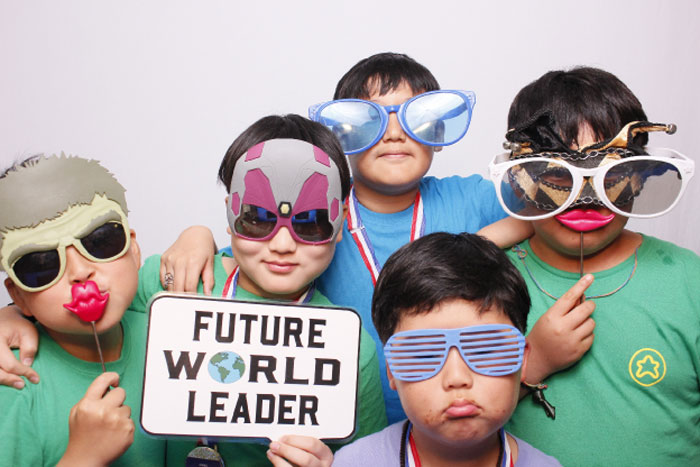
Can Learning About Korea Be Life-Changing? This Culture Camp Founder Thinks So (http://momocamp.org)
As the only Asian kid in his class throughout elementary and middle school, Paik’s first opportunity to learn about his homeland at school was a single paragraph in a 10th-grade world history textbook. And at home, culture was passed down piecemeal, from stories shared by parents and other relatives. With huge parts of his identity left vague and undefined, he struggled to answer even to himself “Who am I?”
Even though Korea is now in the global spotlight — and is no longer overshadowed culturally by China and Japan — this alienating sense of “otherness” remains common among children of Korean heritage, who don’t have many options for learning about Korea in a fulsome, systematic way from the perspective of a person living outside of Korea.
And it’s what inspired Paik to create Momo Camp, a first-of-its-kind summer camp in Korea. Momo Camp offers children of Korean heritage a place to experience Korea firsthand through fun, culturally immersive activities that fill in the learning gaps left by school, home, and pop culture. Campers from all over the world will gather for a month of exploration in and around Seoul, developing a framework for understanding the massive achievement and impact of Korea’s cultural titans, from King Sejong, a national hero akin to the US’s Abraham Lincoln, to the Scorsese-like figure of Bong Joon-ho.
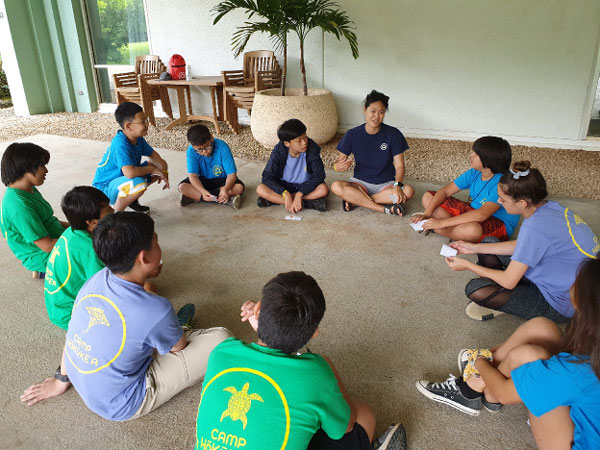
Can Learning About Korea Be Life-Changing? This Culture Camp Founder Thinks So (http://momocamp.org)
Momo Camp’s mission is rooted in learning, Paik notes, not in drawing lines of division or asking campers to cast loyalty to Korea over the country they grew up — something Paik was repeatedly asked to do as a third-culture kid. Rather, the camp offers an encouraging and supportive space for youth to explore these issues of identity and belonging.
Because learning about one’s roots can be life-changing. For Paik, it inspired him to major in East Asian history at college, a decision that ended up shaping his entire career path. He hopes that Momo Camp will do the same for its campers, offering them a transformative experience of Korea that has the potential to positively impact the rest of their lives.
For more information on Momo Camp and to apply for the summer 2024 session, visit www.momocamp.org.
Brochure Link:
https://simplebooklet.com/2024momocampbrochure
Website Link:
http://momocamp.org
Email:
campinfo@momocamp.org
[Exploring Korean Culture](MOMO CAMP) US-Style Summer Camp In Korea Offers Fun, Friendship, and Growth for Third-Culture Kids
[Exploring Korean Culture] (MOMO CAMP) Can Learning About Korea Be Life-Changing? This Culture Camp Founder Thinks So
스마터리빙
more [ 건강]
[ 건강]이제 혈관 건강도 챙기자!
[현대해운]우리 눈에 보이지 않기 때문에 혈관 건강을 챙기는 것은 결코 쉽지 않은데요. 여러분은 혈관 건강을 유지하기 위해 어떤 노력을 하시나요?
 [ 건강]
[ 건강]내 몸이 건강해지는 과일궁합
 [ 라이프]
[ 라이프]벌레야 물럿거라! 천연 해충제 만들기
 [ 건강]
[ 건강]혈압 낮추는데 좋은 식품
[현대해운]혈관 건강은 주로 노화가 진행되면서 지켜야 할 문제라고 인식되어 왔습니다. 최근 생활 패턴과 식생활의 변화로 혈관의 노화 진행이 빨라지고
사람·사람들
more
“취미생활로 다진 친목… 선후배들과 만든 모교사랑”
사진러브한인 사진 동호회 사진러브(회장 크리스 고)는 13일 용수산에서 송년모임을 갖고 한 해를 마무리하는 뜻깊은 시간을 가졌다. 이날 모임에…

[홀인원] 이상원 박사
일반외과 전문의 이상원(왼쪽) 박사가 지난 9일 뉴포트비치 소재 골프장 9번 홀(152야드)에서 레스큐 클럽으로 친 샷이 그대로 홀에 빨려 들…
[송년행사 게시판] 재미시인협회
재미시인협회(회장 지성심)는 오는 20일 오후 4시 가든스윗호텔에서 한 해를 마무리하며 동인지 ‘외지’ 제35집 출판 기념회와 ‘제23회 재미…
[송년행사 게시판] 향군단체 연합
6.25 참전유공자회와 대한민국 육군협회 등 남가주 지역 향군 단체 연합은 19일 오전 11시30분, 용궁에서 송년 행사를 개최한다. 드레스코…
[송년행사 화보] “이웃과 함께 나누고 지인과 함…
KYCC13일 윌튼 플레이스 초등학교에서 열린 ‘한인타운청소년회관(KYCC) 홀리데이 카니발’이 성황리에 막을 내렸다. 올해는 KYCC 창립 …
많이 본 기사
- “1인당 2,000달러 환급금·세금 부담 역대 최저”
- ‘반이민 가속페달’⋯ 시민권자도 대거 추방
- ‘수퍼 독감’ 확산… 확진 4배 급증
- 전현무, 차량 링거 결국 입 열었다.. “의사 진료 처방..불법 NO”
- 센터빌 식당서 벌써 4% 부과 ‘말썽’
- ‘뇌종양 투병’ 윤석화, 끝내 별세..향년 69세
- 캐롤라이나 항공기 추락 조종사·일가족 7명 사망
- “이웃 돌보는 여러분이 동역자”
- 트럼프 행정부, 대마초 규제 완화
- 한인 부인 살해 혐의 남편 법정 출두 무죄 주장
- “암 검진 본인 부담금 폐지”
- 시신 훔쳐 팔아넘긴 부부 징역 중형 1
- 국기원 버지니아-DC 지부, 자랑스러운 태권도인 시상식
- 소기업 지원에 1천만 달러 투자
- 구리 절도 기승⋯ 가로등 ‘깜깜’
- 박수홍 친형, 2심서 징역 3년 6개월 법정구속..형수 오열
- 페어팩스, 낙엽·잔디 폐기물 수거 일시 중단
- 음문석, ‘모범택시3’로 보여준 새로운 얼굴
- 베네수엘라, 해군에 “유조선 호위하라”
- ‘소셜번호 정지’메일 기승
- 한국연극배우협회 “윤석화 별세 사실 아냐”…보도자료 정정·사과
- “보이스피싱 이렇게 당한다”
- 연말이 되면 사라지는 선택들
- 한인 헤지펀드 거물, CNN 인수 추진
- “첼시 판 돈 우크라에 쓰라” 영국, 러 재벌에 최후 통첩
- 거주·투자용 한국 부동산 인기… 한인 유치 ‘치열’
- “연대의 빛으로 증오 극복”
- 상업용 임대계약,‘비즈니스 운명’ 빌리는 일
- ‘주사이모’ 의혹에 입짧은햇님도 활동 중단… “의사라고 믿었다”
- “판공비 1만달러 전액 반환하겠다” 4
- 월드컵 입장권 폭등 비판 FIFA, ‘60달러’ 티켓 발매
- ‘재무장 선언’ 독일, 군장비 대거 구매
- “왜 한국 자산 미국으로 옮겨야 하나… 1
- 한인 다큐 감독 크리스틴 최 별세
- 허위광고 등 ‘연말 사기 주의보’
- ‘브라운대 총기참사’ 뉴욕 한인학생도 총상
- 40·50대 은퇴, 자산은 있는데 확신은 없다
- [금요단상] AI와 동거, 그 실체
- “취미생활로 다진 친목… 선후배들과 만든 모교사랑”
- 엔비디아·구글·오픈AI 등 빅테크들, 美 ‘제네시스 미션’ 합류
- 팀스피릿 부동산그룹 송년모임
- 존 이 시의원 13만불 벌금 LA윤리위원회 최종 판결
- 올해 앵커 재산세 환급 163만명에 18억달러 지급
- 뉴욕주 안락사 합법화 초읽기 호쿨, “안전장치 마련되면 서명”
- 리 장군 동상 철거한 자리에 흑인 소… 2
- 내년 금리인하 전망… 연준 1회, 시장은 2회
- [화제] 베조스 전 부인… ‘기부의 여왕’ 변신
- 오스카 시상식, 2029년부터 유튜브 생중계
- 트럼프 생일날 전국 국립공원 입장 무료
- 천정궁엔 언제? 시계는 어디에?…전재수 불렀지만 첩첩산중
1/5지식톡

-
 ☝️해외에서도 가능한 한국어 선생님…
0
☝️해외에서도 가능한 한국어 선생님…
0이 영상 하나면 충분합니다!♥️상담신청문의♥️☝️ 문의 폭주로 '선착순 상담'만 진행합니다.☎️ : 02-6213-9094✨카카오톡ID : @GOODEDU77 (@골뱅이 꼭 붙여주셔야합니다…
-
 테슬라 자동차 시트커버 장착
0
테슬라 자동차 시트커버 장착
0테슬라 시트커버, 사놓고 아직 못 씌우셨죠?장착이 생각보다 쉽지 않습니다.20년 경력 전문가에게 맡기세요 — 깔끔하고 딱 맞게 장착해드립니다!장착비용:앞좌석: $40뒷좌석: $60앞·뒷좌석 …
-
 식당용 부탄가스
0
식당용 부탄가스
0식당용 부탄가스 홀세일 합니다 로스앤젤레스 다운타운 픽업 가능 안녕 하세요?강아지 & 고양이 모든 애완동물 / 반려동물 식품 & 모든 애완동물/반려동물 관련 제품들 전문적으로 홀세일/취급하는 회사 입니다 100% …
-
 ACSL 국제 컴퓨터 과학 대회, …
0
ACSL 국제 컴퓨터 과학 대회, …
0웹사이트 : www.eduspot.co.kr 카카오톡 상담하기 : https://pf.kakao.com/_BEQWxb블로그 : https://blog.naver.com/eduspotmain안녕하세요, 에듀스팟입니다…
-
 바디프렌드 안마의자 창고 리퍼브 세…
0
바디프렌드 안마의자 창고 리퍼브 세…
0거의 새제품급 리퍼브 안마의자 대방출 한다고 합니다!8월 23일(토)…24일(일) 단 이틀!특가 판매가Famille: $500 ~ $1,000Falcon: $1,500 ~ $2,500픽업 & 배송직접 픽업 가능LA…
케이타운 1번가
오피니언
 한영일 / 서울경제 논설위원
한영일 / 서울경제 논설위원[만화경] 웰다잉 인센티브
 캐슬린 파커 워싱턴포스트 칼럼니스트
캐슬린 파커 워싱턴포스트 칼럼니스트 [캐슬린 파커 칼럼] 아이들을 온라인에서 보호하기
 양상훈 수필가ㆍ시인
양상훈 수필가ㆍ시인 [한국춘추] 경제대공황ㆍ제2차 세계대전 승리로 극복한 루스벨트 리더쉽

[왈가 왈부] 고환율에 외환 건전성 완화·서학개미 규제… 미봉책 아닌가요
 수잔 최 한미가정상담소 이사장 가정법 전문 변호사
수잔 최 한미가정상담소 이사장 가정법 전문 변호사 [수잔 최 변호사의 LIFE &] AI 시대 편리함에 안주하지 말자
 김도년 성균관대 건축학과 교수 스마트도시·건축학회장
김도년 성균관대 건축학과 교수 스마트도시·건축학회장 [로터리] 지멘스가 만드는 미래 동네
1/3지사별 뉴스

‘브라운대 총기참사’ 뉴욕 한인학생도 총상
▶총상 입은 상황서도 동료학생 의식 잃지않도록 도와 ▶부친도 동문 “우리 가족에게 고통스러운 일”지난 13일 발생한 브라운대학교 총기난사(본보…
뉴욕주 안락사 합법화 초읽기 호쿨, “안전장치 마련되면 서명”

“이웃 돌보는 여러분이 동역자”
워싱턴성광교회(담임목사 임용우)는 18일 한인단체와 소방서‧도서관 등에 총 2만9천 달러의 성금을 전달했다. 지난 2011년부터 15년째 지역…
소기업 지원에 1천만 달러 투자

베이지역 스포츠팀, SF 한인회에 후원금
샌프란시스코 베이지역 한인회(회장 김한일)는 한인 메이저리거 이정후 선수의 소속팀인 샌프란시스코 자이언츠(San Francisco Giants…
불자커뮤니티 20일 청소년발표회및 송년회

오늘 하루 이 창 열지 않음 닫기 




























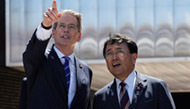







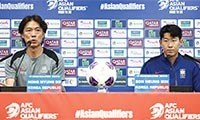
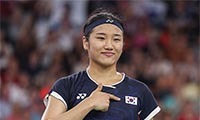














.png)


댓글 안에 당신의 성숙함도 담아 주세요.
'오늘의 한마디'는 기사에 대하여 자신의 생각을 말하고 남의 생각을 들으며 서로 다양한 의견을 나누는 공간입니다. 그러나 간혹 불건전한 내용을 올리시는 분들이 계셔서 건전한 인터넷문화 정착을 위해 아래와 같은 운영원칙을 적용합니다.
자체 모니터링을 통해 아래에 해당하는 내용이 포함된 댓글이 발견되면 예고없이 삭제 조치를 하겠습니다.
불건전한 댓글을 올리거나, 이름에 비속어 및 상대방의 불쾌감을 주는 단어를 사용, 유명인 또는 특정 일반인을 사칭하는 경우 이용에 대한 차단 제재를 받을 수 있습니다. 차단될 경우, 일주일간 댓글을 달수 없게 됩니다.
명예훼손, 개인정보 유출, 욕설 등 법률에 위반되는 댓글은 관계 법령에 의거 민형사상 처벌을 받을 수 있으니 이용에 주의를 부탁드립니다.
Close
x